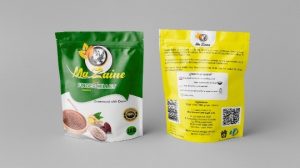African youths are resilient and in the face of many daunting challenges have embraced entrepreneurship which has not only served as a form of job creation across the continent but has also contributed to the economy of the continent.
The various emerging entrepreneurs on the continent have various reasons that prompted them into whatever trade or service they are providing but in all, they are creating a niche for themselves.
African Leadership Magazine’s Correspondent, Omowumi Odesomi spoke with one of Nigeria’s budding entrepreneurs, Maryam Yakubu Yanah, the Founder and CEO of Mainstream Lime-Light Ltd, producers of Ma’Zaine Foods in Kebbi State, Northern Nigeria on her motivation for the business and her surviving skills in the industry.
Excerpts:
ALM: Most emerging entrepreneurs today will tell you they got into business to beat unemployment. What is your own story, especially in the Nigerian food industry which is flooded with all sorts of processed and packaged foods business owners all targeted at the same consumers?
MARYAM: After I graduated from Ahmadu Bello University, Zaria in northern Nigeria, I went into photography, worked in a studio, and then went for youth service. After the youth service, I got a job at an engineering firm in Lagos where I worked for three years, got married, and had to leave Lagos.
I resigned because my husband was in the north. After I resigned, I came back to the north, Katsina state but was always bored because I was used to the busy life of Lagos so I decided to go into the asoebi business( selling party clothes in bulk) because I had already made my contacts in Lagos, I supplied to different parts of Nigeria and even US and UK and I leveraged on social media to get my customers.
Maryam Yakubu
As time went by, I got more visibility and people referred more customers to me. There was a time I supplied at one of the northern governor’s sons’ weddings and it was huge, from there my husband got another job in Kebbi where I continued my asoebi business but I noticed something, when we go to visit some families, out of five families we visited, two or three members had diabetes and I wondered why this was so and they don’t have varieties of food in Kebbi, they only have fonio and millets, if they want to eat healthy food, it’s only centred around fonio and millet.
So, I decided to do something in that regards and add to what they have to give them varieties of food to eat. So, I did some research and asked some health and nutrition professionals, and that was how I came about finger millet, tiger nut, date, and sweet potato, all processed into flour.
some of the processed and packaged foods produced by Ma’zaine Foods in Kebbi Sate, Northern Nigeria owned by Maryam Yakubu. Picture Source : Maryam
I also realised that a lot of mothers around here are unable to lactate after delivery, so that gave birth to lactation pap, we also did child formulas which are tom-brown, so this was what made me go into the food processing business.
ALM: Do you have any unique selling point that stands your product out and gives you a chance ahead of others?
MARYAM: The passion I have for healthy and nutritious meals grew and I had to start teaching people how to process different types of food, I also didn’t stop there, I went ahead to get certifications both nationally and internationally and that has set us apart.
It started as a passion and now that passion has really grown and we’re bringing people in. So far, I have ten workers, and sometimes when we have more work to do, I have to either outsource or bring temporary staff to work after that pay them and they go.
ALM: Interesting, so would you say the Nigerian business clime is accommodating for young businesses and emerging entrepreneurs thereby overriding challenges?
MARYAM: Every business is challenging, starting a business is challenging and staying in business is challenging but it depends on you, the business owner, if you’re determined, passionate and focused on starting and staying in business. you can do it.
Nigeria is accommodating, you can start up a business anywhere you are in Nigeria, and no one will stop you. I had my challenges when I started then, I didn’t have a lot of money, so I started with what I had in my kitchen at home.
My first NAFDAC registration was from home because then Nigerian Vice President, Professor Yemi Osinbajo said that small businesses can register their businesses at home so Nafdac came to my house, did their inspection and certified my first two products and after that, I continued growing and when I couldn’t continue at home, I had to rent a place and moved my business there. Again, where I rented was small, so I’ve moved to a technological incubation centre where I have a larger space for production, that is because I was determined.
In all these stages, it wasn’t easy. There were times that I had large orders without money to produce them, and there were times that I was the only one doing everything because I couldn’t pay but now, I have outgrown that.
I wouldn’t say I now have all the money to produce in large quantity, but we have grown to a level where we can meet our customer’s demand because last year we were always out of stock and unable to meet customers demands so we planned, planning here means taking some loans to get raw materials to produce in large quantities.
It has been challenging but because I’m in the business out of passion, to make a difference and produce healthy nutritious food for Nigerians and the world at large, that is what is keeping me not because the business is not challenging.
The food business industry in Nigeria is very challenging, it has to do with a lot of registrations, and you have to be careful in production because what you’re producing must be healthy and must be done in a healthy environment and must also be free from contaminants so that whoever is consuming is taking in a healthy nutritious food.
ALM: Based on your experiences, what do you feel the government can do to encourage new businesses?
MARYAM: The government can encourage new businesses by taking off tax for small business owners i.e startups and also come up with policies to ensure relevant agencies support such new start-ups with loans or grants.
There is also the need for more tech incubation centres where start-ups can register and be guided on their products and services for at least the first three years of existence.
ALM: What advice can you give to aspiring entrepreneurs?
MARYAM: Aspiring entrepreneurs must go into a business to solve a problem and must be passionate about solving that problem. You do not just go into business because others are going into it.
Some of us break down at times and go through sleepless nights but because we’re passionate, that keeps us going. It is not easy, and they do not have to wait till they have all the money in the world. I started with less than 5000 from my kitchen, so please start with what you have and keep reinvesting the money back into the business until you get to where u want to be.
That is how to grow.
Maryam Yakubu Yanah is a graduate of Archaeology from Ahmadu Bello University Zaria. She is the Founder and CEO of Mainstream Lime-Light Ltd, producers of Ma’Zaine Foods. Maryam is a serial entrepreneur, mentor, startup coach, consultant, food safety agent and an agro-processor committed to producing and packaging a variety of nutritious ready-to-cook food.
Maryam was recognized as one of the Top 20 Remarkable MSME Founders in 2022. She also serves as Kebbi state representative of ‘ACT4Food Act4Change’, a global youth-led movement promising to ignite a campaign action to combat hunger, improve health and heal the planet.




